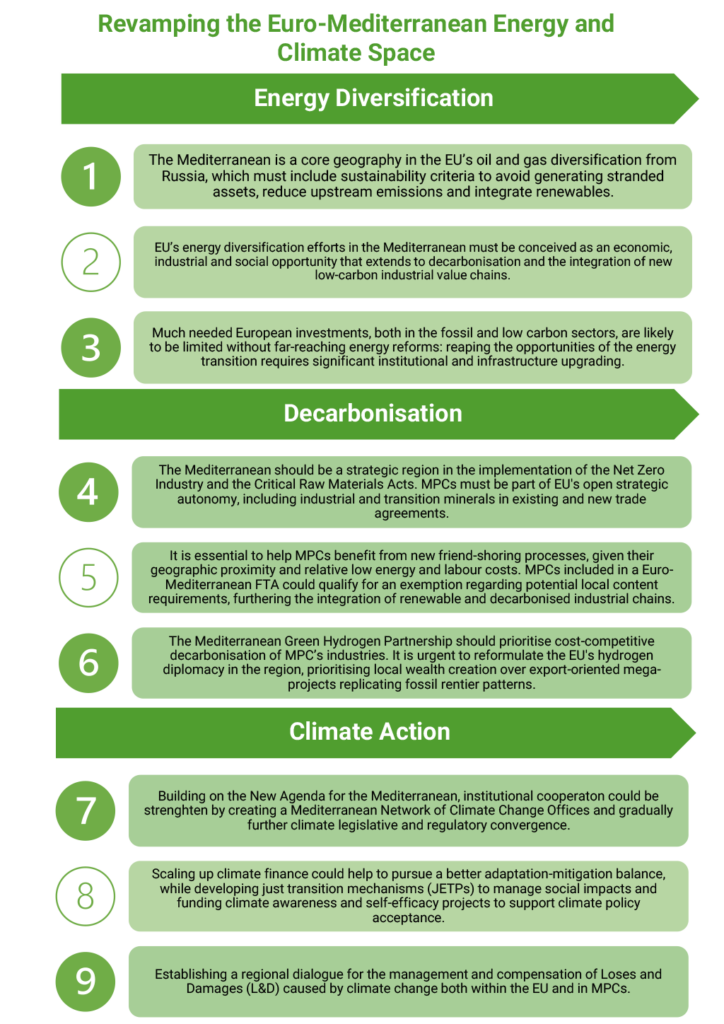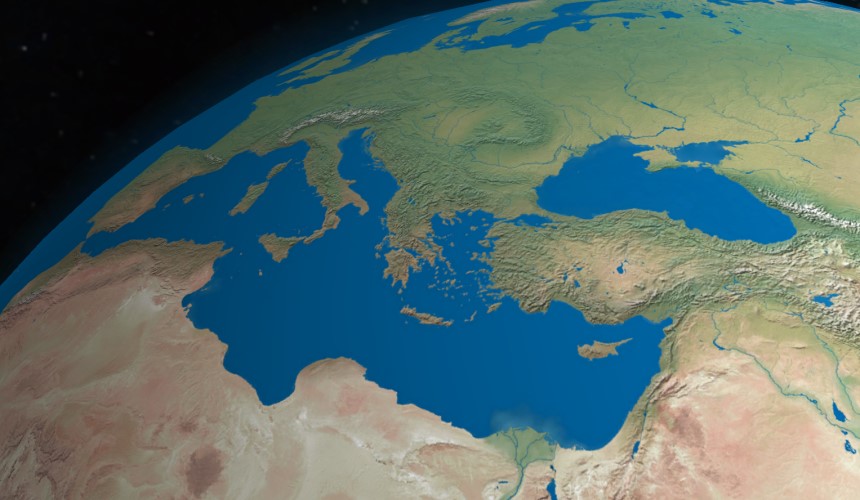Executive Summary

1. Introduction[1]
Russia’s invasion of Ukraine has radically changed the European energy landscape. While continuing to lead the energy transition, the EU needs to rapidly rebalance its energy supplies. The publication of the REPowerEU plan by the European Commission outlined a clear roadmap: accelerating the energy transition and reducing hydrocarbon imports from Russia to zero well before 2030 (Commission, 2022a), with the Mediterranean Basin playing a key role in fossil and renewable diversification efforts. In parallel, Mediterranean Partner Countries (MPCs) seem to have entered a new phase of revitalised interest in renewable energy and in hydrogen deployment, their climate mitigation plans are being reviewed and their need to enhance climate adaptation capacities is increasingly urgent.
This new energy context urges rethinking Euro-Mediterranean relations in both the short and the long terms. In the short term, by integrating Europe’s Mediterranean neighbourhood into EU’s immediate energy diversification efforts. In the long run, by fostering fruitful long-term relations that prepare the region for a decarbonised development model aligned with the European Green Deal (EGD) and the Paris Agreement. The current situation in both Europe and the MPCs requires the EU to develop a new strategic approach to the region, which has so far been ineffective in relaunching the Euro-Mediterranean project (Escribano & Lázaro, 2020). Implementing this strategic reorientation towards climate and renewable cooperation in the Mediterranean can yield appealing decarbonised interdependence patterns that complement the existing fossil fuel-based relations before gradually replacing them in the long run.
This Policy Paper proposes three drivers for the renewal of the Euro-Mediterranean energy script: diversification, decarbonisation and climate action. The paper is structured as follows. Section 2 briefly analyses the key trends in Euro-Mediterranean energy relations and how the Russian invasion of Ukraine has increased the relevance of the Southern Neighbourhood for the EU. The third section explains how climate change is impacting the region and summarises the recently announced climate and renewable targets of the MPCs. The fourth section focuses on the geopolitics of both fossil fuels and decarbonisation, including electricity exchanges and the implications of the Carbon Border Adjustment Mechanism (CBAM). Based on the previous results, section 5 identifies three areas in which Euro-Mediterranean cooperation is developing and reflects on how it could be strengthened: the EU’s fossil diversification, the deployment of renewable and other low-carbon technologies, and institutional climate cooperation and engagement. The last section summarises the results and offers some policy recommendations.
(2) A fragmented Euro-Mediterranean Energy Space
In 1995, the EU and Southern Mediterranean partners committed to turning the Mediterranean basin into an area of dialogue, exchange and cooperation, guaranteeing peace, stability and prosperity in accordance with the Barcelona Declaration. While energy, and more recently climate, have been repeatedly proposed as key drivers for Euro-Mediterranean cooperation (Rhein, 1997; Escribano, 2010; Tagliapietra, 2016), almost three decades later the EU has not been able to offer the Maghreb and the Eastern Mediterranean appealing energy cooperation pathways, be they fossil or renewable. As for climate cooperation, several initiatives such as Depollution of the Mediterranean (which includes climate adaptation), ClimaSouth and Clima-Med (Shyrokykh, Dellmuth & Funk, 2023) and Cities for Climate (C4C) have sought to enhance capacity building, legislative and policy convergence, knowledge exchange and to facilitate access to climate finance, with varying degrees of success (Katsaris, 2015). The EU has failed to extend its model of multilateral cooperation, suffering diplomatic setbacks in its attempts to advance a regional project. Amid the current energy crisis, the state of Euro-Mediterranean energy relations and its prospects are afflicted by a sense of fatigue, and countries are increasingly focusing on bilateral solutions.
In the last two decades, the EU’s most ambitious energy diplomacy initiatives had to be abandoned because of their lack of realism or inadequacy for the region’s dynamics, like the Euro-Mediterranean energy ring, the Mediterranean Solar Plan (the EU version of the DESERTEC project) or the extension of the Energy Community to the region. The common element across these projects was the focus on exporting energy from MPCs to Europe instead of supporting the EU neighbourhood in meeting their booming energy demand in a sustainable way (Tagliapietra, 2018). Even some of the gas projects that successfully materialised are now operationally paralysed due to geopolitical issues, such as the Maghreb-Europe Pipeline exporting Algerian gas to the Iberian Peninsula, or largely idle, like the Greenstream, bringing Libyan gas to Italy. The lack of success in these projects represents the end of momentum for energy integration via natural gas in the Maghreb that started in the 1990’s, aimed to emulate the accomplishments of Europe through coal and the ECSC.
Mega-projects were accompanied by weak institutions, like the so-called gas, electricity and renewables platforms supported by the Union for the Mediterranean (UfM): the MEDREG, a collaborative platform for energy regulators; and MED-TSO, a technical platform of the Mediterranean Transmission System Operators (Rubino, 2015). More regionally focused alternative schemes, such as the 5+5 initiative constituted by the 10 countries bordering the Western Mediterranean lack sufficient traction, mainly because of the different views of its members on both shores regarding energy and the absence of economic tools that exclusively rely on EU hands, like the EU’s trade agreements or cooperation funds (Escribano, 2017). These platforms have been largely unable to deliver a Euro-Mediterranean energy policy space, suffering from a short-sighted and simplistic vision of the complexities involved in the region’s energy interdependencies.
The deep political divide in the Southern Mediterranean itself has further hindered the operability of these institutions, hampering necessary processes such as functional energy integration through cross-border infrastructures, the liberalisation of the Mediterranean neighbours’ energy sector and the convergence of their regulations with European norms, delaying their energy transition (Escribano & Lázaro, 2020). The EU’s 2016 Foreign and Security Policy commitment to ‘principled pragmatism’ did not lead to significant changes in regional energy dynamics and the gradual loss of European influence continued until the Russian invasion of Ukraine unleashed an unprecedented energy crisis.
The credibility crisis of Euro-Mediterranean relations is not restricted to energy. It spans the broader economic dimension of the relations after 25 years of low-intensity free trade that has limited the access of Southern Mediterranean agricultural products and workforce to EU markets. There has also been limited European investment in the region, with a few exceptions such as Morocco and Tunisia, where the EU has led inward FDI flows in the 2003-19 period (OECD, 2021).
The exhaustion of European influence in the Mediterranean has opened the door to the entry of new players in the energy sector, a phenomenon that reflects the new reality of the North African and Middle Eastern regional system after the 2011 Arab uprisings of ‘competitive multipolarity’, in which several regional and external actors compete in variable alliances, introducing overlapping geopolitical dynamics (Kausch, 2015). Russia and Turkey have tried to benefit from the geopolitical situation in the region, successfully challenging the EU’s energy influence in Libya or Syria (Tekir, 2020). China is also increasingly relevant in the region through its Belt and Road Initiative (BRI), with a growing presence in the Algerian energy and petrochemical sectors since 2014, when both countries signed a ‘Comprehensive Strategic Partnership’ (Hamaizia, 2020). In the case of renewables, Gulf Cooperation Council strategic funds such as Masdar and ACWA have spearheaded the financing of mega-projects, particularly in Morocco and Egypt.
[1] The authors would like to thank the members of the Energy and Climate Programme Working Group, and in particular Cristina Moral and David Gallardo, for their valuable input and comments.
Image: Digital rendering of the satellite view of the Mediterranean Sea. Photo: Przemek Pietrak (Wikimedia Commons / CC BY 3.0).





